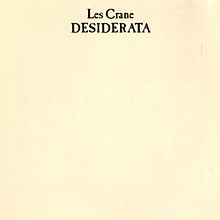
"Desiderata" is a 1927 prose poem by the American writer Max Ehrmann. The text was widely distributed in poster form in the 1960s and 1970s.

Lizard is the third studio album by British progressive rock band King Crimson, released on 11 December 1970 by Island Records in the UK, and in January 1971 by Atlantic Records in the United States and Canada. It was the second consecutive King Crimson album recorded by transitional line-ups of the group that did not perform live, following In the Wake of Poseidon. This is the only album by the band to feature singer and bass guitarist Gordon Haskell and drummer Andy McCulloch as official members of the band.
"Deteriorata" is a comedy record released as a single in 1972. It is a parody of Les Crane's 1971 spoken word recording of "Desiderata", the early 20th-century poem by Max Ehrmann.

Les Crane was a radio announcer and television talk show host, a pioneer in interactive broadcasting who also scored a spoken word hit with his 1971 recording of the poem Desiderata, winning a "Best Spoken Word" Grammy. He was the first network television personality to compete with Johnny Carson after Carson became a fixture of late-night television.

"I Can Hear Music" is a song written by Jeff Barry, Ellie Greenwich and Phil Spector for American girl group the Ronettes in 1966. This version spent one week on the Billboard Pop chart at number 100. In early 1969, the Beach Boys released a cover version as a single from their album 20/20 (1969), peaking at number 24 in the US.
"Desiderata" is an early 1920s poem by Max Ehrmann.

"Got a Hold on Me" is a song by Christine McVie, released as the lead single from her eponymous second solo album in 1984.

"(Your Love Keeps Lifting Me) Higher and Higher" is an R&B song written by Gary Jackson, Raynard Miner, and Carl Smith. It was recorded by Jackie Wilson for his album Higher and Higher (1967), produced by Carl Davis, and became a Top 10 pop and number one R&B hit.

"Another Saturday Night" is a 1963 hit single by Sam Cooke from the album Ain't That Good News. The song was written by Cooke while touring in England when staying in a hotel where no female guests were allowed. It reached No. 10 on the Billboard Hot 100 and was No. 1 on the R&B chart for a single week. In the UK, the song peaked at No. 23 on the UK Singles Chart.

Hawaii Five-O is an instrumental album by the Ventures. It is named for the popular 1968 television series, and featured the theme song from the series composed by Morton Stevens as its title track. It was released in 1969 on Liberty Records LST-8061 and reached #11 on the Billboard Top LP chart, staying for 24 weeks. The album was certified gold by RIAA on July 21, 1971. The popularity of the album was propelled by the hit title track, which reached #4 on the Billboard Pop Singles chart.
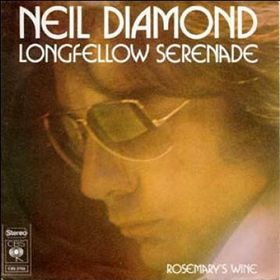
"Longfellow Serenade" is the title of a 1974 song by the American singer-songwriter Neil Diamond. It was written by Diamond, produced by Tom Catalano, and included on Diamond's album Serenade.

"Spinning Wheel" is a song from 1968 by the band Blood, Sweat & Tears, written by Canadian lead vocalist David Clayton-Thomas and appearing on their eponymous album.

"An Old Fashioned Love Song" is a 1971 song written by Paul Williams and performed by the American pop-rock band Three Dog Night. Chuck Negron performed the lead vocal on this track. Taken as the first single from their 1971 album, Harmony, the song peaked at number 4 on the Billboard Hot 100 chart in December 1971, becoming the band's seventh top-ten hit. It was Three Dog Night's first record to top the U.S. easy listening chart. It reached number 2 in Canada.
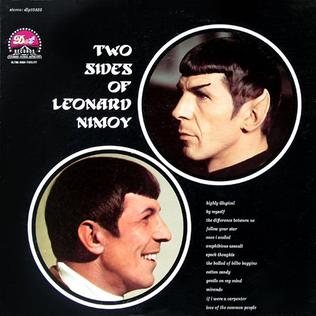
Two Sides of Leonard Nimoy is Leonard Nimoy's second album released shortly after Music from Outer Space. It was released in early 1968 by Dot Records and reached 97 on the US album chart.
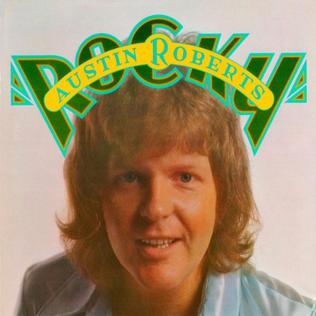
"Rocky" is a song written by Ronald Johnson and performed by American country music artist Dickey Lee. It was released in July 1975 as the fifth single and title track from the album Rocky. On the country chart, "Rocky" was Lee's most successful single, and his only number one. It spent fourteen weeks on the chart, including one week at number one.

"An American Dream" is a song written by Rodney Crowell. He recorded it under the title "Voilá, An American Dream" on his 1978 album Ain't Living Long Like This, and released it as the B-side to that album's single "(Now and Then There's) A Fool Such as I".
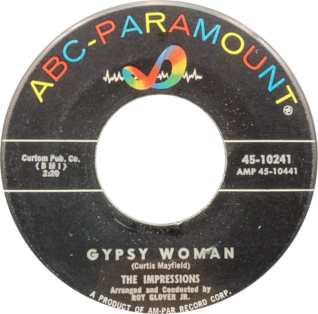
"Gypsy Woman" is a 1961 rhythm and blues song written by Curtis Mayfield and recorded by his group the Impressions. The group's first single following the departure of lead singer Jerry Butler, it reached No. 2 on the US Billboard R&B chart, No. 20 on the Billboard Hot 100 and number 17 on the Cash Box chart. It also appeared on the group's 1963 eponymous debut album. Joe Bataan (1967), Brian Hyland (1970), Bobby Womack (1985), Steve Marriott (1989), and Santana (1990) covered this song.

"Never Ending Song of Love" is a song written by Delaney Bramlett, and, according to some sources, by his wife Bonnie Bramlett. It was originally recorded with their band, Delaney & Bonnie & Friends, in 1971 on the album Motel Shot. Released as a single by Atco Records the same year, "Never Ending Song of Love" became Delaney & Bonnie's greatest hit on the pop charts, reaching a peak of No. 13 on the Billboard Hot 100 and No. 8 on Easy Listening. It reached No. 16 in Australia.

"Stormy" is a hit song by the Classics IV released on their LP Mamas and Papas/Soul Train in 1968. It entered Billboard Magazine October 26, 1968, peaking at #5 on the U.S. Billboard Hot 100 chart and #26 Easy Listening. The final line of the chorus has the singer pleading to the girl: "Bring back that sunny day". The single, along with the prior release of "Spooky" and, soon after, the release of "Traces", formed a trio of solid hits for the band.

"Really Wanna Know You" is a 1981 song by Gary Wright that was a hit single in the U.S., reaching No. 16 on the Billboard Hot 100. It was taken from the album The Right Place. The song spent 17 weeks on the chart and became Wright's third biggest U.S. hit. It was his final charting single.
